Key takeaways:
- Marine conservation is essential for the balance of ocean ecosystems and directly affects both marine life and human well-being.
- Effective advocacy strategies include grassroots organizing, education, and social media to raise awareness and inspire action.
- Collaborating with local organizations enhances the impact of conservation efforts and fosters community connections to marine ecosystems.
- Sharing success stories, like ecosystem recoveries and youth initiatives, cultivates hope and encourages ongoing community engagement in marine conservation.
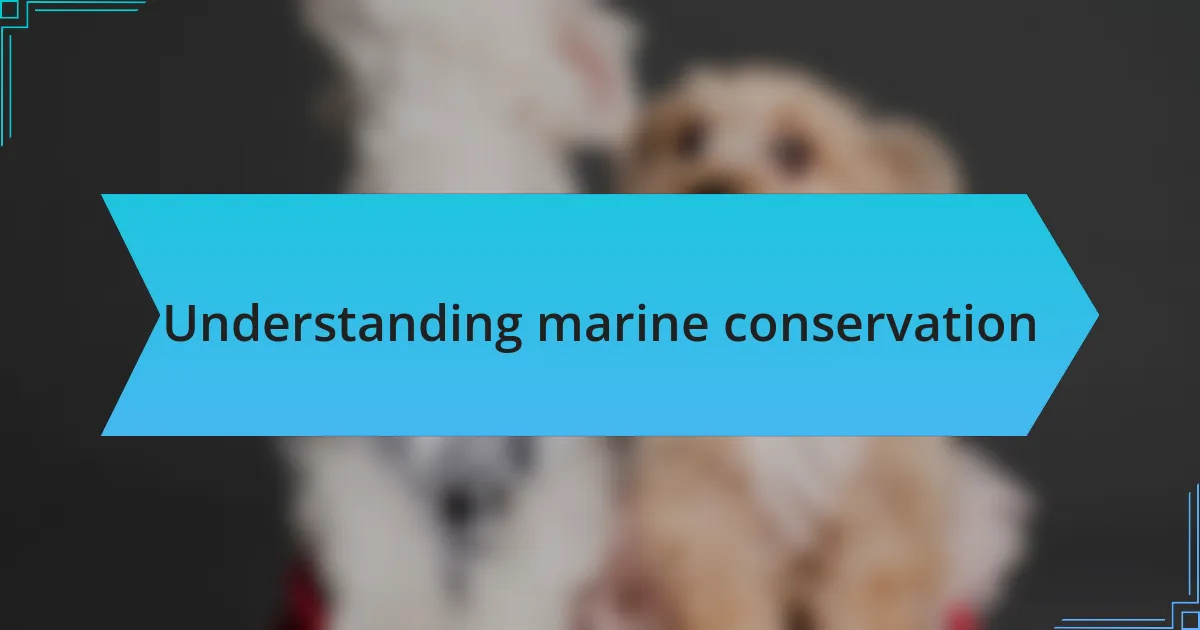
Understanding marine conservation
Marine conservation is about protecting the delicate balance of our ocean ecosystems. I vividly recall my first visit to a coral reef; the vibrant colors and diverse marine life left me in awe. But as I learned more about threats like climate change and pollution, a sense of urgency washed over me—how can we stand by while our oceans, so full of life, face such danger?
Understanding marine conservation also means acknowledging the interconnectedness of all living creatures. When I realized that the health of our oceans directly impacts not only marine life but also human well-being, it was a turning point for me. Have you ever considered how our daily choices, like plastic use, affect distant coral reefs? It’s a sobering thought, isn’t it?
The importance of marine conservation extends beyond biology; it encompasses cultural and economic dimensions, too. I remember volunteering at a marine cleanup event and meeting fishermen who expressed their concerns about dwindling fish populations—people whose livelihoods depended on healthy oceans. This experience reinforced my belief that advocating for marine conservation is not just about saving fish and reefs; it’s about supporting communities and ensuring a sustainable future for all.
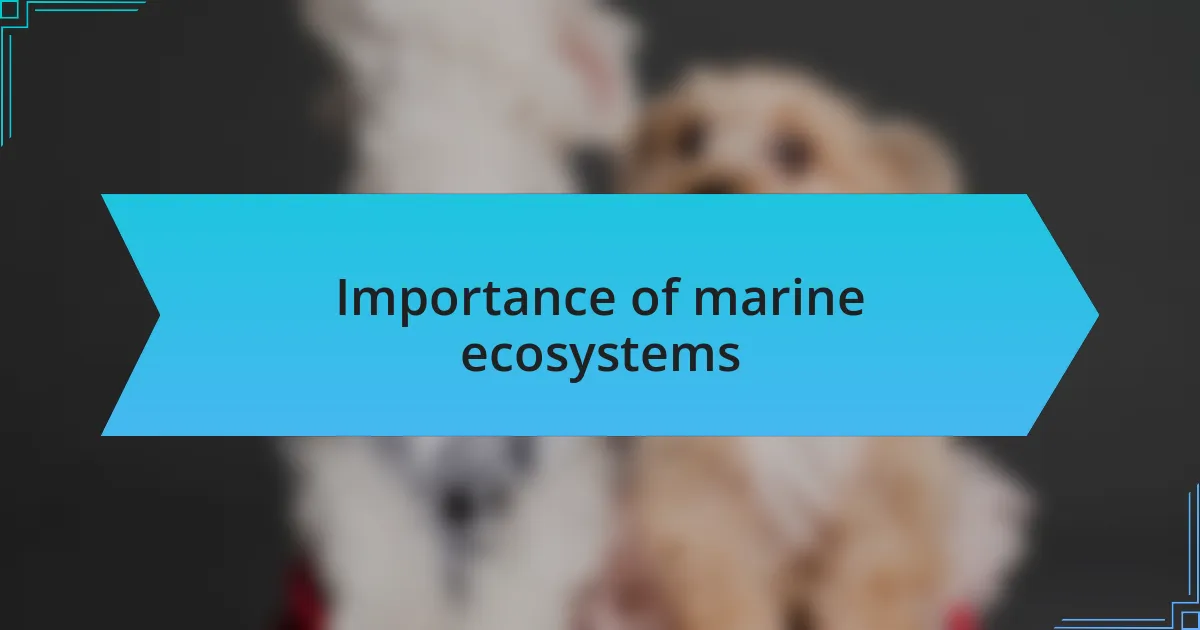
Importance of marine ecosystems
Marine ecosystems are crucial not only for the myriad species that inhabit them but also for their role in regulating the Earth’s climate. I once attended a lecture where a marine biologist passionately explained how oceans absorb carbon dioxide, mitigating the impacts of climate change. It struck me how vital these ecosystems are; imagine a world without their protective influence—how would we cope?
The rich biodiversity found within marine ecosystems also supports countless livelihoods. I vividly recall a heartwarming encounter with a local fisherman who shared stories of his grandfather’s fishing practices and the gradual changes he’s witnessed over the decades. Listening to him, I realized that every fish caught not only represents sustenance but a culture deeply rooted in our relationship with the ocean. Can we afford to let this heritage fade away?
Moreover, healthy marine ecosystems contribute to our economy through tourism and recreation. Reflecting on my own experience snorkeling in crystal-clear waters, I felt an overwhelming sense of peace mixed with a responsibility to protect such beauty. How can we prioritize profit over the irreplaceable treasures found beneath the waves? The reality is, preserving these ecosystems is vital for both our enjoyment and the well-being of future generations.
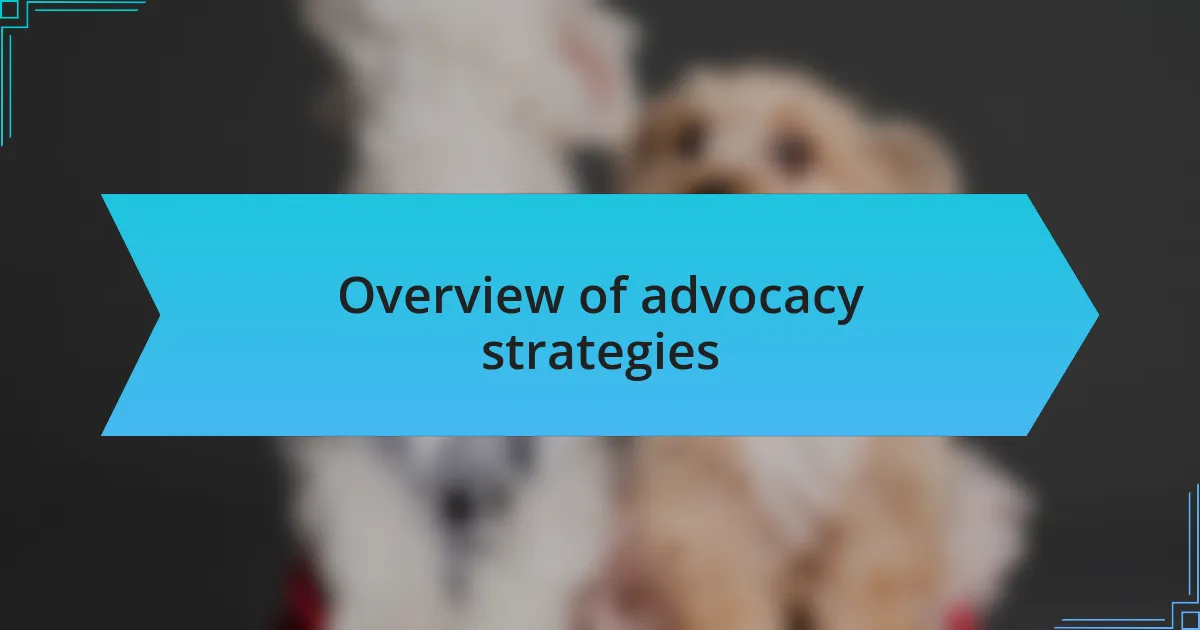
Overview of advocacy strategies
Advocacy strategies for marine conservation are diverse and powerful tools that can truly make a difference. One effective approach is grassroots organizing, where local communities come together to raise awareness about important issues affecting their coastal environments. I remember joining a beach cleanup event once, where not only did we collect trash, but we also sparked conversations about the health of our oceans. This collective action not only united us but also ignited a sense of responsibility within each participant—how many more people could we engage with this kind of initiative?
Another strategy is leveraging education and outreach programs, which help to inform the public about the complexities of marine ecosystems. I once volunteered at a marine science center where we held workshops for children. Witnessing their wide-eyed excitement as they learned about sea turtles and coral reefs reminded me that fostering a love for the ocean in younger generations is key to long-term advocacy. If we can inspire them now, imagine the passionate advocates they will become in the future.
Lastly, using social media to amplify voices and share stories can create a ripple effect in raising awareness. I often find myself scrolling through posts that highlight the beauty of marine life and the urgent need for conservation. One post about a coral bleaching event caught my eye, sparking a deep discussion among my friends about our own environmental practices. Can a simple share or tweet genuinely motivate others to act? I’ve seen it happen—each conversation has the potential to create a wave of change, one person at a time.
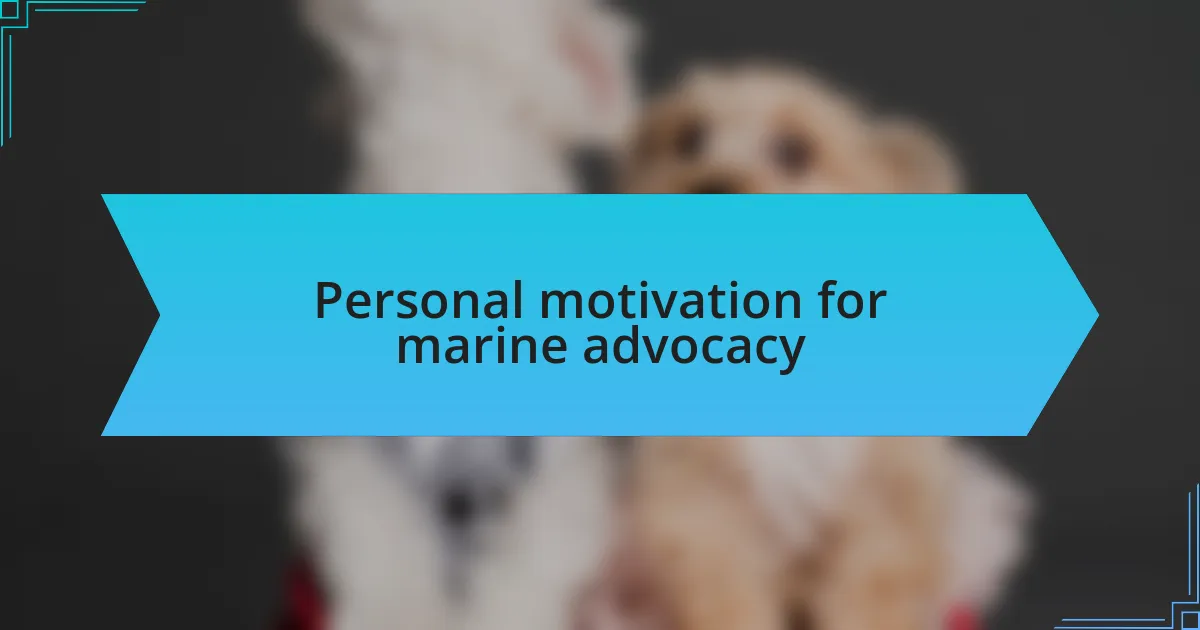
Personal motivation for marine advocacy
In my journey as a marine advocate, the most profound motivation has been my childhood experiences at the beach. I remember spending countless weekends collecting shells and observing the vibrant sea life. Those early encounters ignited a deep fascination for the ocean, but as I grew older, I began to realize how fragile this beauty truly is. How could I let such wonder slip away without doing anything about it?
My motivation also stems from near heart-wrenching moments when I witnessed the impact of pollution on marine habitats. I once stumbled upon a beached dolphin while hiking along a shoreline, and the haunting image of its lifeless body left an indelible mark on me. That moment was more than just shocking; it became a catalyst for my commitment to marine advocacy. How could I stand by when the ocean, which had brought me so much joy, was in peril?
Additionally, the connections I’ve built with fellow advocates provide a powerful drive to persevere. Sharing stories of success and struggle during local meetings creates an electrifying atmosphere, filled with hope and determination. In those moments, I often find myself asking, “What if my efforts could inspire another person to join this cause?” It’s these exchanges that remind me of the collective strength we possess, reinforcing my belief that every small action adds to the larger fight for marine conservation.
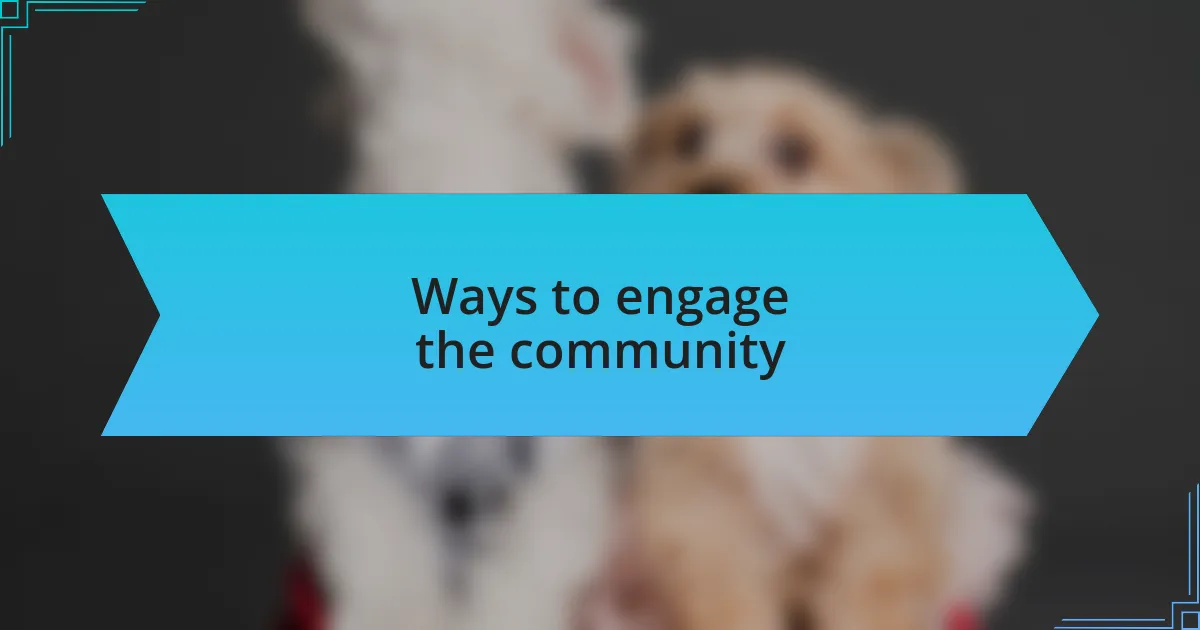
Ways to engage the community
One effective way to engage the community in marine conservation is through hands-on beach cleanups. I recall my first experience leading a cleanup; the sense of camaraderie among participants was uplifting. As we filled trash bags with debris, it sparked conversations about marine life and the importance of preserving our ocean habitats. Isn’t it amazing how a shared experience can plant the seeds of awareness and responsibility in people’s hearts?
Another impactful strategy is to host educational workshops that invite local experts to share their knowledge. I once attended a seminar featuring a marine biologist who brought along fascinating specimens. I noticed how much attendees were enthralled, asking questions and expressing genuine curiosity. Facilitating such events can transform passive observers into informed advocates. Who wouldn’t want to feel empowered to make a difference after learning firsthand about the ocean’s wonders?
Engaging local schools is another vital avenue for outreach. When I visited a high school to present on ocean conservation, I was struck by the students’ enthusiasm. Their curiosity was palpable; they eagerly brainstormed ideas for conserving marine life in their own neighborhoods. It made me wonder: what if we inspired a new generation of advocates, right in our own community? By involving young people, we not only spread awareness but also foster lifelong champions for the oceans.
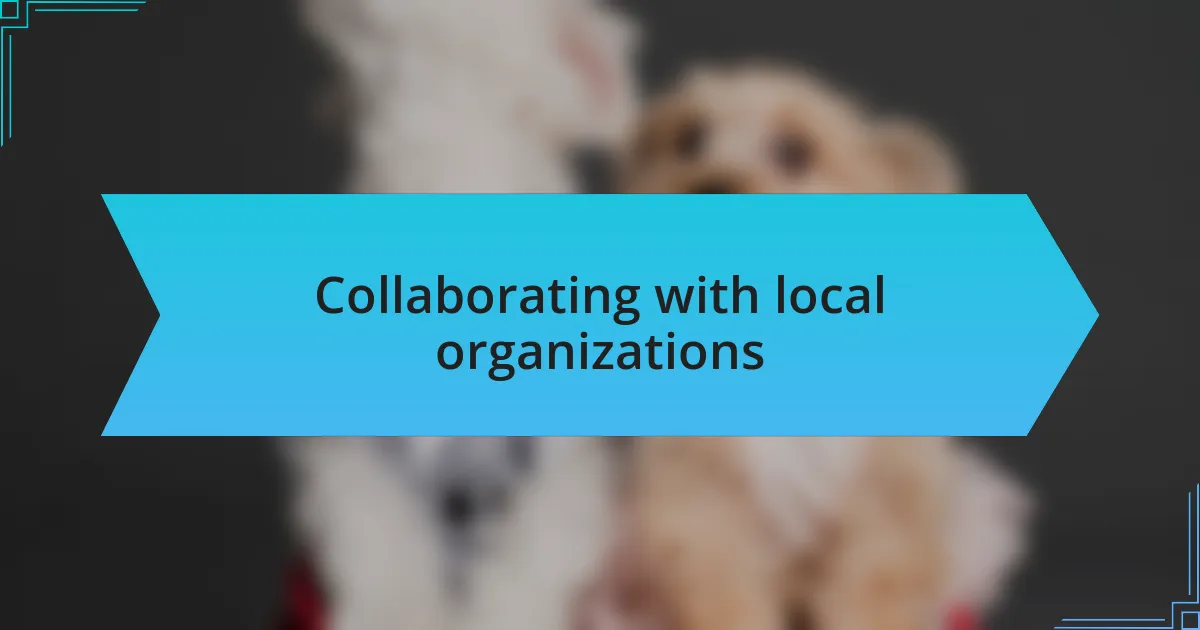
Collaborating with local organizations
Collaborating with local organizations can significantly amplify the impact of marine conservation efforts. I remember partnering with a community non-profit that focuses on coastal protection. During our joint initiatives, I witnessed how aligning our missions brought out the best in both groups, resulting in not just increased participant involvement but also a richer exchange of innovative ideas. Isn’t it fascinating how working together can lead to solutions that neither party might have discovered alone?
In my experience, leveraging the expertise of local organizations fosters a sense of shared responsibility for marine ecosystems. One time, I worked with a local diving club to organize an underwater cleanup. The excitement was palpable; divers came together, sharing tips and stories while actively protecting our precious reefs. It made me realize how collaboration can cultivate deeper connections to our environment and inspire people to take their advocacy beyond just one event. Isn’t that the kind of passionate response we want to see?
Moreover, these partnerships often lead to more sustainable practices within the community. When I collaborated with a local eco-business to promote responsible fishing, we held a forum that brought fishermen, conservationists, and consumers into one room. The discussions were heartfelt and occasionally heated, reflecting the complex dynamics at play. In those moments, I saw how necessary it is to bridge different perspectives to create a collective vision for our oceans. How else can we find common ground if not through open dialogue and collaboration?
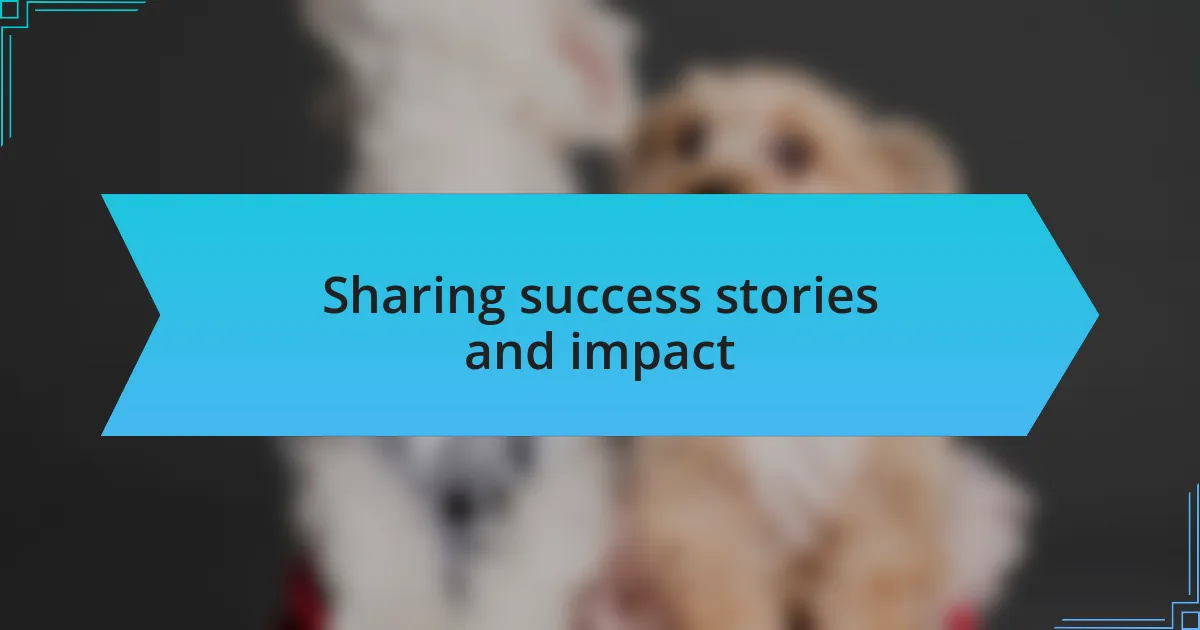
Sharing success stories and impact
Sharing success stories in marine conservation truly amplifies the hope and determination in the community. I recall a particularly heartwarming event where we celebrated a local bay’s recovery after years of concerted cleanup efforts. Seeing families picnic by the water, children catching glimpses of returning marine life, and hearing their stories of involvement truly struck a chord within me—did we ever think we could bring back such vibrant ecosystems?
One of my favorite moments was when a group of children from a nearby school presented their marine awareness project to the community. They had organized beach cleanups and started their own recycling initiative, sharing their success at a local festival. Witnessing these young advocates glow with pride made me reflect on the power of education and engagement; it reminded me that every small success nurtures future stewards of the sea. Isn’t it incredible how such initiatives can inspire both young and old to forge a lasting connection with our oceans?
The impact of these stories cannot be understated. During a presentation at a local conference, I shared the incredible results of our collaborative efforts, highlighting before-and-after photos of thriving coral reefs. The applause that followed was more than just appreciation; it was a call to action. It made me think—if we can rally support around tangible success stories, how many more lives can we change and how much more can we protect? Those moments of collective celebration reinforce that we’re all in this together, pushing for a healthier planet.